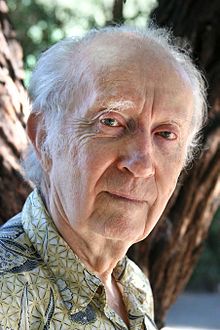
Back جون بي. كوب Arabic جون بى. كوب ARZ John B. Cobb German John B. Cobb Spanish جان بی. کاب Persian John B. Cobb French John B. Cobb ID 존 캅 Korean John B. Cobb Dutch John B. Cobb Portuguese
John B. Cobb Jr. | |
|---|---|
 Cobb in 2013 | |
| Born | John Boswell Cobb, Jr. February 9, 1925 Kobe, Hyōgo Prefecture, Japan |
| Nationality | American |
| Spouse |
Jean L. Cobb (m. 1947) |
| Academic background | |
| Alma mater | University of Chicago |
| Thesis | The Independence of Christian Faith from Speculative Beliefs[1] (1952) |
| Doctoral advisor | Charles Hartshorne |
| Influences | |
| Academic work | |
| Discipline | |
| School or tradition | |
| Institutions | |
| Doctoral students | |
| Main interests | |
| Notable ideas |
|
| Influenced | |
John Boswell Cobb Jr. (born February 9, 1925) is an American theologian, philosopher, and environmentalist. He is often regarded as the preeminent scholar in the field of process philosophy and process theology, the school of thought associated with the philosophy of Alfred North Whitehead.[4] Cobb is the author of more than fifty books.[5] In 2014, Cobb was elected to the prestigious American Academy of Arts and Sciences.[6]
A unifying theme of Cobb's work is his emphasis on ecological interdependence—the idea that every part of the ecosystem is reliant on all the other parts. Cobb has argued that humanity's most urgent task is to preserve the world on which it lives and depends,[7] an idea which his primary influence, Whitehead, described as "world-loyalty".[8]
Cobb is well known for his transdisciplinary approach, integrating insights from many different areas of study and bringing different specialized disciplines into fruitful communication. Because of his broad-minded interest and approach, Cobb has been influential in a wide range of disciplines, including theology, ecology, economics, biology, and social ethics.
In 1971, he wrote the first single-author book in environmental ethics, Is It Too Late? A Theology of Ecology, which argued for the relevance of religious thought in approaching the ecological crisis.[9] In 1989, he co-authored the book For the Common Good: Redirecting the Economy Toward Community, Environment, and a Sustainable Future, which critiqued global economics and advocated for a sustainable, ecology-based economics. He has written extensively on religious pluralism and interfaith dialogue, particularly between Buddhism and Christianity, as well as the need to reconcile religion and science.
Cobb is the co-founder and co-director of the Center for Process Studies in Claremont, California.[10] The Center for Process Studies remains the leading Whitehead-related institute, and has witnessed the launch of more than thirty related centers at academic institutions throughout the world, including twenty-three centers in China.[11][12]
- ^ Cobb, John B. (1952). The Independence of Christian Faith from Speculative Beliefs (PhD thesis). Chicago: University of Chicago. OCLC 80987653.
- ^ "Dissertations Completed". Religious Studies Review. 18 (2): 170–176. 1992. doi:10.1111/j.1748-0922.1992.tb00087.x.
- ^ "Jean Cobb: Loving Wife and Mother, Librarian". Claremont Courier. 4 February 2016. Archived from the original on 27 March 2019. Retrieved 8 March 2019.
- ^ Roland Faber, God as Poet of the World: Exploring Process Theologies (Louisville: Westminster John Knox Press, 2008), 35; C. Robert Mesle, Process Theology (St. Louis: Chalice Press, 1993), 126; Gary Dorrien, "The Lure and Necessity of Process Theology," CrossCurrents 58 (2008): 316; Monica A. Coleman, Nancy R. Howell, and Helene Tallon Russell, Creating Women's Theology: A Movement Engaging Process Thought (Wipf and Stock, 2011), 13.
- ^ Process and Faith, "John B. Cobb Jr." http://processandfaith.org/misc/john-b-cobb-jr
- ^ "American Academy of Arts and Sciences". Retrieved 24 June 2014.
- ^ John B. Cobb, "Intellectual Autobiography", Religious Studies Review 19 (1993): 10.
- ^ Alfred North Whitehead, Religion in the Making (New York: Fordham University Press, 1996), 60.
- ^ The Center for Environmental Philosophy, "History of Environmental Ethics for the Novice," http://www.cep.unt.edu/novice.html
- ^ The Center for Process Studies, "About the Center for Process Studies," "The Center for Process Studies: About the Center for Process Studies". Archived from the original on 11 January 2010. Retrieved 14 December 2009.
- ^ Institute for the Postmodern Development of China, "Collaborative Centers," "Collaborative Centers - Institute for the Postmodern Development of China". Archived from the original on 19 December 2013. Retrieved 19 December 2013.
- ^ "China embraces Alfred North Whitehead," last modified 10 December 2008, Douglas Todd, The Vancouver Sun, retrieved 5 December 2013, http://blogs.vancouversun.com/2008/12/10/china-embraces-alfred-north-whitehead/ Archived 10 March 2016 at the Wayback Machine.
© MMXXIII Rich X Search. We shall prevail. All rights reserved. Rich X Search